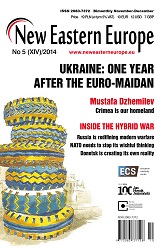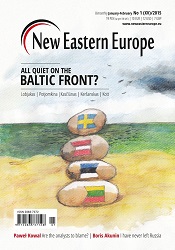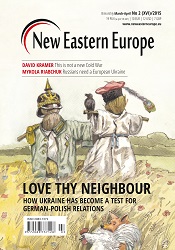
Crimea is our Homeland
An interview with Mustafa Dzhemilev, leader of the Crimean Tatar National Movement.
More...We kindly inform you that, as long as the subject affiliation of our 300.000+ articles is in progress, you might get unsufficient or no results on your third level or second level search. In this case, please broaden your search criteria.

An interview with Mustafa Dzhemilev, leader of the Crimean Tatar National Movement.
More...
The conflict between Russia and Ukraine has confirmed that Eastern Europe remains a volatile space. In this regard Europe received its first wake-up call in 2008 during the Russian-Georgian War. In 2014, Europe received a second wake-up call – presenting an opportunity that cannot be missed.
More...
While not an easy concept to define, a hybrid war is mostly based on unconventional means of combat that go beyond the understanding of military conflict put forward by Carl von Clausewitz in the 19th century. The case of Ukraine perfectly illustrates the reality of a 21st century conflict and at the same time presents the dangers of the many dimensions of hybrid warfare.
More...
A near-total lack of alternatives to the status quo belied the record-high number of parties competing in regional elections held at various levels across Russia on September 14th 2014. The gubernatorial and municipal polls in St Petersburg constitute a particularly striking example of how the regime used the elections to consolidate its grip on power and suppress dissenting voices.
More...
With access to Ukrainian-language media cut off in areas under rebel control, local pro-separatist and Russian media outlets continue to expand their campaign on the information front of the war. Most of those living in rebel-controlled territory have been successfully persuaded that Kyiv is to blame for the city’s destruction.
More...
An interview with Wolfgang Templin, German essayist,leader of the democratic opposition in East Germany.
More...
Why did the astonished West helplessly watch Russian troops enter Crimea and Donbas? How was it that, as popular opinion states, “nobody” could have “foreseen” this event? One of the hypotheses that comes to mind is that the analysts are to blame. Will the “Crimea mistake” be repeated in regard to the next moves of Vladimir Putin? Years from now, will we be reading about the “nuclear mistake”; as time and again nobody is taking Putin seriously?
More...
To say that the current situation in the region does not create a good setting for stable policymaking is to understate the severity of the predicament. It has put enormous demands on Estonian policymakers who can only hope that Russia respects Estonian sovereignty. If not, then Estonia will respond as forcefully as it can.
More...
In the first half of 2015 Latvia will hold the Presidency of the EU Council. Within the country there is a broad political consensus that the EU Eastern Partnership programme affects Latvia’s security and economic interests. However, Latvia is not unconditionally supportive of the EU’s enlargement towards the Eastern Partnership and it has adopted a more nuanced view that the partner countries must have a perspective of EU membership,but only in cases when they are willing and ready for it.
More...
The previous year marked an important milestone for both Eastern Europe and Europe as a whole. The conflict that led to an undeclared war in eastern Ukraine, which started when then-president Viktor Yanukovych decided not to sign the Association Agreement in November 2013, is an important wake-up call of a rising revanchism in the Kremlin.
More...
Since the upheavals in Ukraine in 2014, tensions have risen markedly in the countries around the Baltic Sea. The annexation of Crimea and the support for the so-called “people’s republics”of Donetsk and Luhansk are seen by many as disquieting evidence of the current Russian leadership’s aggressive intentions. The question now remains: what will Sweden’s role in the region be in the face of growing security tensions with Russia?
More...
A conversation with Jānis Kārkliņš, director of the NATO Strategic Communications Centre of Excellence (NATO StratCom COE) in Riga, and Raul Rebane, an Estonian journalist and communication consultant.
More...
Kaliningrad is a city which appeared on the map only after the Second World War. Its predecessor, Königsberg, existed for almost 700 years but was wiped off the face of the earth during the war. Kaliningrad became a total denial of it, with a new name, new inhabitants and a new identity. Since the fall of the Soviet Union, however, and the opening of its border with Poland, the city now finds itself struggling with its identity as the “Russian West”.
More...
In the first days of the EuroMaidan Revolution, German media, politicians and the wider public saw the events in Kyiv through a simple and affirmative lens. However, once it became clear that a full-blown conflict between Russia and Ukraine was possible, the German public quickly reverted to its well-known pacifist reflexes. This was the moment when the pro-Russian attitudes of the German public coincided with German materialistic interests in avoiding sanctions and an interpretation of the events became easily susceptible to Russian propaganda.
More...
Moscow has always wanted to be seen as a credible European partner that guaranteed the delivery of resources such as natural gas. Yet, in light of the Ukraine crisis, it has revealed its true face, with its actions causing significant damage to Russian companies, including Gazprom and Rosneft. Even the best of the Kremlin’s propagandists cannot manage to cover up the fact that outdated technology and western sanctions will force Russia to review its energy policy.
More...
The annexation of Crimea by the Russian Federation has been difficult for a majority of the Crimean Tatars. Many have lost their jobs, fled or just disappeared. Those that remain, now fear that their homeland, which they fought so hard toget back in Soviet times, has once again been taken away.
More...
The recent political turmoil experienced by Georgia’s ruling Georgian Dream Coalition could be a sign of history repeating itself, yet it could also be the start of the institutionalisation of the party system and political stabilisation in the country. All of this, however, depends on a number of critical political developments that will take place between now and the 2016 parliamentary elections.
More...
A conversation with Mikheil Saakashvili, President of Georgia from 2004 to 2013.
More...
Following mass protests resembling those of Occupy Wall Street or Tahrir Square that began in the summer of 2013 in Bulgaria, one would assume a significant shift in the subsequent parliamentary elections.Yet, following the October 2014 elections, it seems that the biggest winner was the status quo.
More...
A conversation with Karl Schlögel,a German historian, essayist and writer.
More...